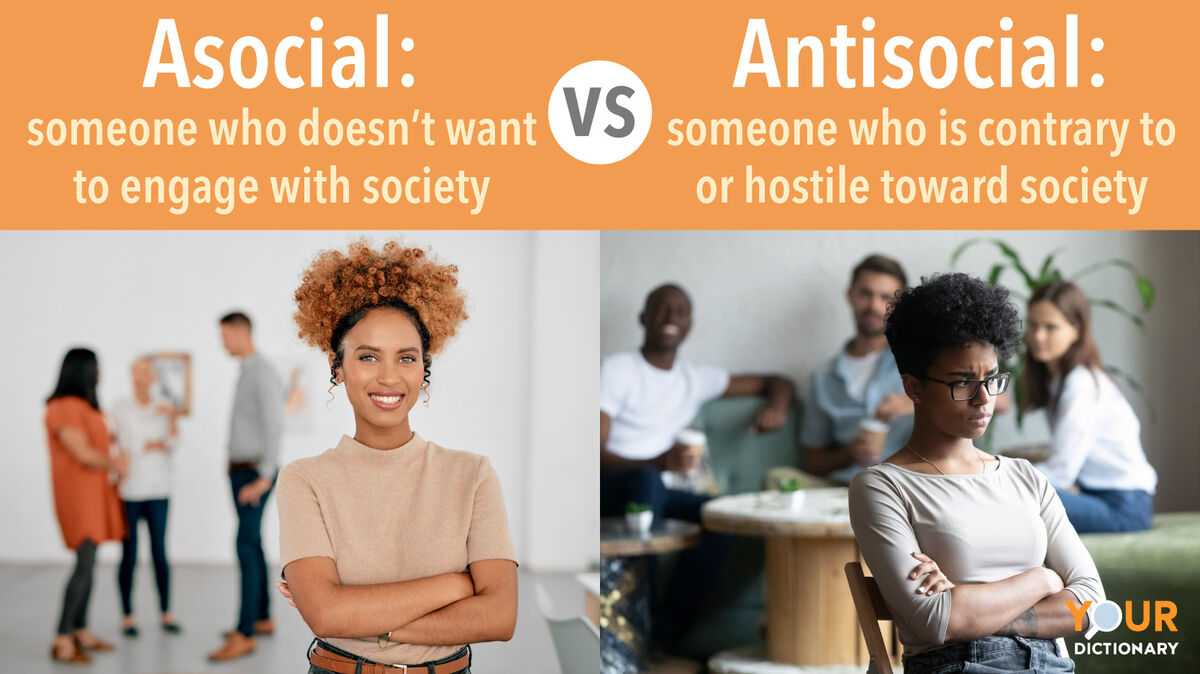
You’ve probably heard someone who doesn’t enjoy the constant company of others called an introvert or someone who lacks empathy referred to as a psychopath. However, you’re less likely to hear asocial or antisocial in daily conversation when these may in fact be the more accurate words to use. These terms each describe different mental conditions or behavioral traits.
The Difference Between Asocial and Antisocial
While asocial and antisocial look similar and may even be used interchangeably, they each describe separate behaviors with different characteristics.
asocial - someone who doesn’t want to engage with society
antisocial - someone who is contrary to or hostile toward society
Difference Between the Prefixes a- and anti-
The difference between asocial and antisocial boils down to their prefixes a- and anti-. These Latin prefixes distinguish the meaning of the words, and knowing their meanings can help you tell these terms apart.
a - without or lack of
anti - against
social - someone or something that enjoys being with others or has to do with people living or gathering in groups
Meaning and Usage of Asocial
Asocial is a personality trait that refers to "a person who doesn’t like to interact with people or engage in social gatherings, is indifferent to society or who withdraws from society." Unlike introverted people who may seek social interactions but need time by themselves to “recharge,” people who are asocial tend to be disinterested in or adverse to social interaction with others.
The doctor said I’m asocial because I’m not interested in social groups.
He called me asocial just because I didn’t want to hang out on Saturday.
I think I’m asocial, but I haven’t had a formal diagnosis.
Antisocial Defined
Antisocial is defined as "someone who is antagonistic toward or even a threat to society." It can also refer to people who are unable or unwilling to associate with others, not to be confused with asocial. Additionally, antisocial is a personality trait that can refer to "the behavioral symptoms of antisocial personality disorder (ASPD)," which can include psychological conditions such as psychopathy and sociopathy.
Antisocial personality is defined as a disregard for others.
The students thought he was antisocial because he hated people.
People who are antisocial are more likely to break the law.
What Is Antisocial Personality Disorder (ASPD)?
Antisocial personality disorder (ASPD) is a mental condition characterized by a long-term pattern of lying, cheating, stealing, manipulating, or exploiting others without remorse. This can also apply to more violent criminal activities in extreme cases. ASPD is better known by the labels psychopathy or sociopathy, which are similar diagnoses but have slightly different traits. The simplest explanation is that sociopaths are made and psychopaths are born, but it is more complicated than that.
psychopath - someone is born with a mental disorder that makes them prone to antisocial behavior, notably lack of empathy, disregard for rules or morals and disregard for other people
sociopath - typically learned antisocial behavior characterized by lack of empathy and a faint conscience
Be Conscious of the Correct Word
Antisocial personality is often characterized by a lack of conscience, but what is the difference between conscience and conscious? Are actions amoral or immoral? Explore the difference between these and other similar-sounding words so you can choose the correct word every time.